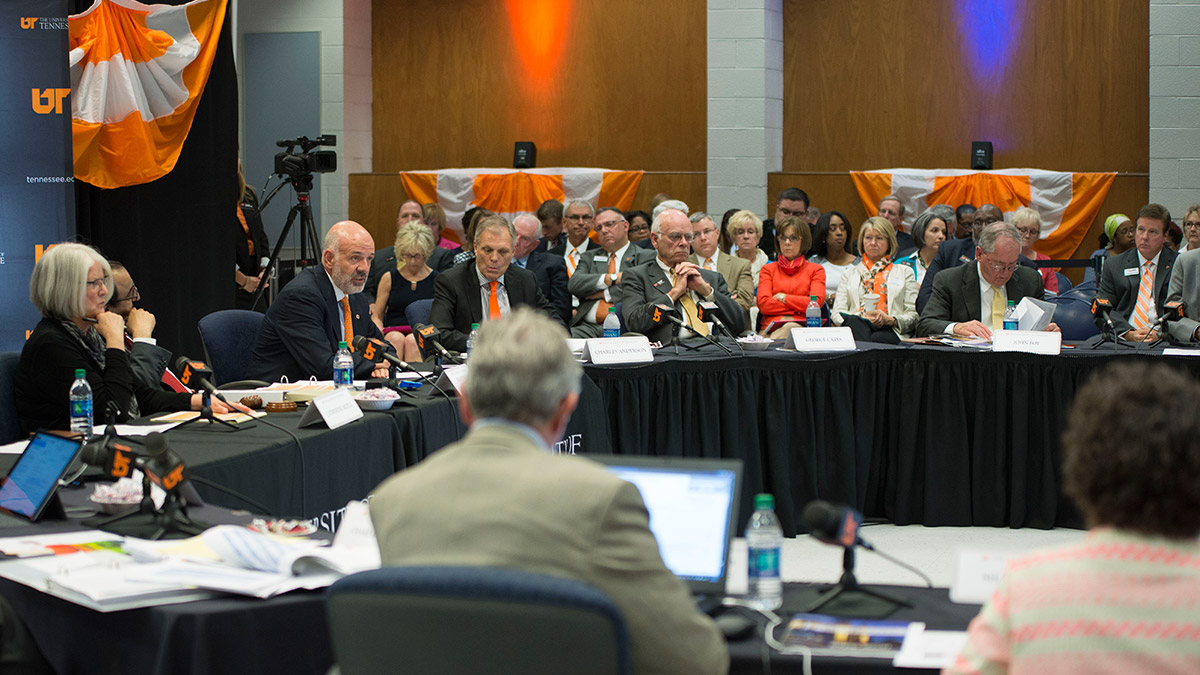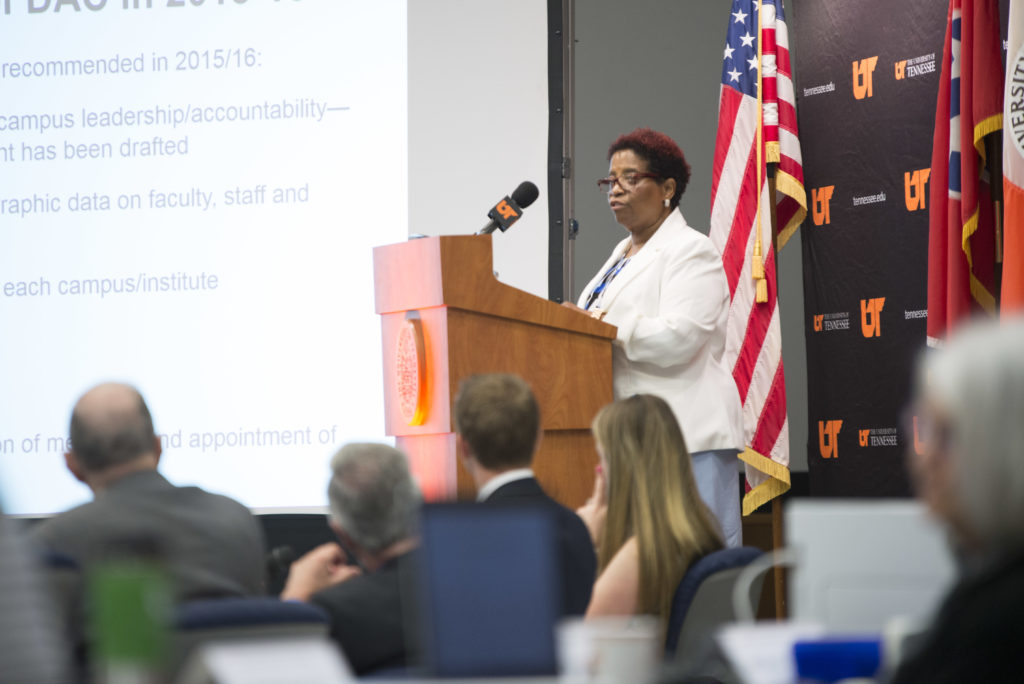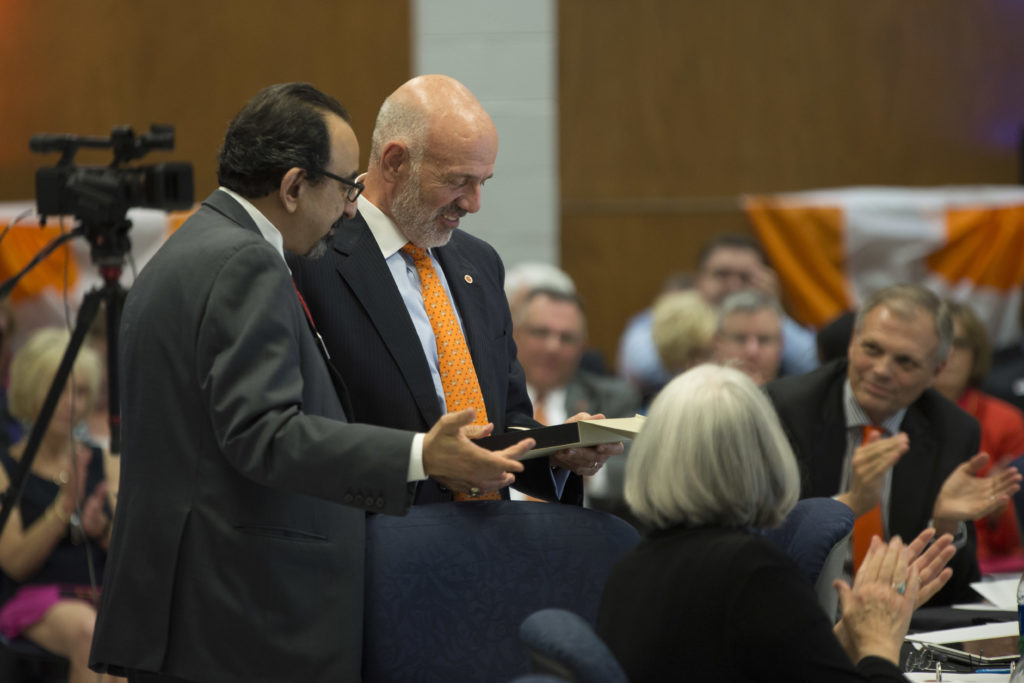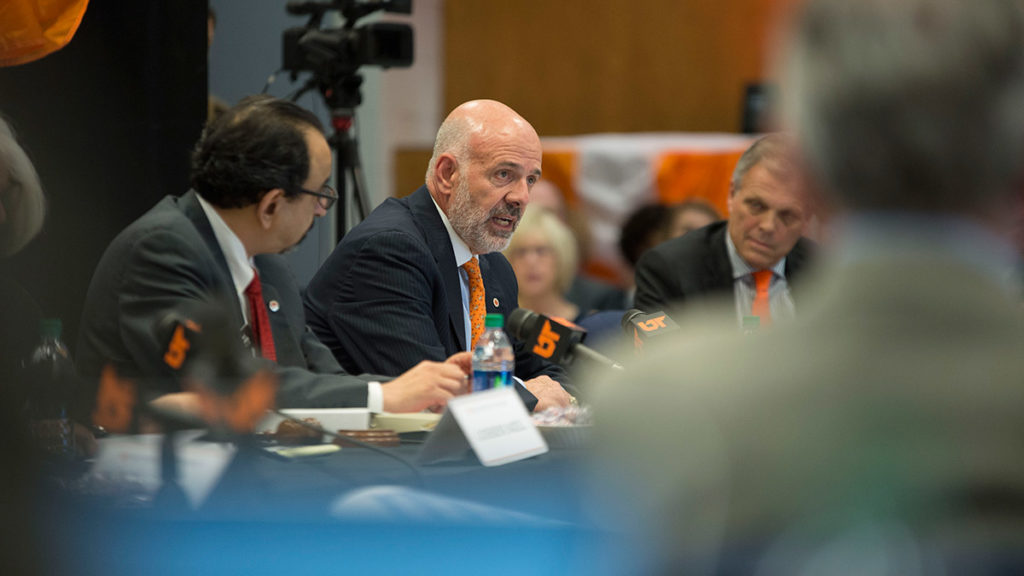
KNOXVILLE – For the second consecutive year, University of Tennessee tuition increases will be the lowest in more than three decades.
The UT Board of Trustees approved the proposed increases as part of the University’s fiscal 2016-2017 budget during the board’s annual meeting in Knoxville today. The last time undergraduate tuition increases were 3 percent or less for two years in a row was 1978-1979.
In-state tuition will increase no more than 2.2 percent for most undergraduates—the lowest since 1984—and the majority of fees will not increase. Of those for which a change was approved, the net increase at each campus ranges from 0 percent to 3 percent.
“We are very grateful for increased financial support from the state over the last couple of years that has helped greatly in holding down tuition increases,” DiPietro said. “At the same time, it’s also true that we, as an institution, have taken very seriously the need to do all we can to cut our costs and maximize our resources. The good work in this area has made a great impact.”
Fiscal 2016-2017 is the second year of DiPietro’s system-wide initiative to achieve long-term financial sustainability. Each campus and institute is reallocating resources to reduce a funding gap originally projected to exceed $377 million by FY 2024-25. Efforts include voluntary retirement incentives, eliminating low-priority programs, achieving administrative efficiencies, finding alternative revenue sources and implementing innovative student recruitment programs. Combined with unanticipated state funding increases in 2015 and 2016, these measures have helped UT hold tuition increases to the rate of inflation for the second straight year.
The University’s FY 2017 budget of $2.2 billion represents a 3.4 percent increase from FY 2016 and includes a $28 million increase in unrestricted state funding. The budget sets aside $32.1 million for a salary increase pool that will be allocated among UT campuses and institutes and distributed to employees according to plans developed by each entity.
UT also received state funding for capital projects and capital maintenance, including $63.1 million for the UT Chattanooga Academic Classroom Building renovation and the UT Health Science Center’s Dentistry Faculty Practice/Research Building. The state is also providing more than $29.3 million for six capital maintenance projects.
DiPietro reaffirmed his commitment to diversity and inclusion at the University during his report to the Board Thursday.
“Inclusion is essential to student success,” DiPietro said. “When students feel that they and their groups are included, they are better able to perform academically.”
DiPietro said some troubling past incidents indicate that some students arrive on campus without an understanding of both the reality and the importance of diversity and multiculturalism. Such an understanding is key to both a campus environment of civility and enhanced learning opportunities, and to meeting expectations of prospective employers, DiPietro said.

A new special adviser to the president for diversity and inclusion is intended to heighten the University’s system-level focus in both these areas. DiPietro announced his appointment of Noma Anderson to the role, effective July 1. Anderson has been dean of the UT Health Science Center College of Health Professions since 2010 and has served as chair of the president’s Diversity Advisory Council since its formation in 2010.
“Supporting and advancing a culture that is welcoming and empowering to all is our responsibility as educators and my commitment as president of this great institution,” he said.
In accordance with legislation passed by the Tennessee General Assembly earlier this year, the board approved the creation of two new, standing committees – an Athletics Committee, and a University Life Committee – and five new subcommittees. The subcommittees are:
- Student Conduct, Rights and Responsibilities, under the Academic Affairs and Student Success Committee
- Community and Alumni Relations, under the Advancement and Public Affairs Committee
- Efficiency and Cost Savings; and Tuition, Fees and Financial Aid, both subcommittees under the Finance and Administration Committee
- Nonacademic Programs, a subcommittee under the newly created University Life committee
Also in compliance with the legislative rule, a new public comment period will be designated at each future Board meeting. Within a designated, 30-minute timeframe, individual members of the general public – including UT faculty and students – may address the Board or one of its committees for up to five minutes after pre-registering to do so five days prior to a meeting. A maximum of six individuals will have opportunity to speak and comments may not address UT employee grievances, appeals or threatened litigation.

In reviewing DiPietro’s performance as UT president, Board Vice Chair Raja Jubran praised DiPietro for exceeding expectations on many fronts.
“Due to his high integrity and moral character, he has re-established trust and confidence in the office of the president,” Jubran said. DiPietro’s leadership in significant progress on Budget Advisory Group/sustainable funding initiatives was key in holding 2015 tuition increases to the lowest levels in 30 years, Jubran added.
“Much more is to be done, but I am confident Dr. DiPietro’s commitment and leadership will produce continuing progress over the next few years,” Jubran wrote in his report.
The board approved a 5 percent increase for FY 2016-2017 in DiPietro’s base salary.
In other business, the Board approved:
- “Soar in Four,” a new UT Martin undergraduate tuition model in which full-time students pay for 15 credit hours a semester to incentivize completion in four years.
- UT Knoxville “Vol Vision 2020” strategic plan refresh, with goals for increased undergraduate retention, doctoral and master’s degrees awarded, and federal research funding; along with narrowing faculty and staff salary gaps from market levels.
- A fiscal year 2016-17 Performance Incentive Payment Plan for University Officers, but not the actual goals. Setting and approving the goals is postponed until the fall Board meeting.
- UT Chattanooga’s differential tuition of $56 per credit hour for new doctoral programs in occupational and physical therapy, among the lowest in the United States, to help fund scholarships, research, equipment and faculty development.
- A policy granting each campus latitude to manage student housing, including developing unique policies, procedures and agreements applying to facility leasing, residence assignments, occupancy, pricing, safety, construction, maintenance, use and visitation.
- Agreement for ongoing service by UT President Emeritus Joe Johnson for annual cost of $69,792.
- Honorary resolutions for former trustee David Golden, a UT Institute of Agriculture professor, and former vice chair Brian Ferguson for their service on the Board.
- Recommendations for tenure.
For an archived webcast of the full board meeting and meeting materials, go to trustees.tennessee.edu/.
The University of Tennessee is a statewide system of higher education with campuses in Knoxville, Chattanooga, Martin and Memphis; the UT Space Institute in Tullahoma; the UT Institute of Agriculture with a presence in every Tennessee county; and the statewide Institute for Public Service. The UT system manages Oak Ridge National Laboratory through its UT-Battelle partnership; enrolls about 50,000 students statewide; produces about 10,000 new graduates every year; and represents more than 360,000 alumni around the world.

